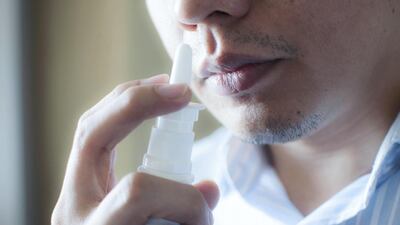A Covid vaccine delivered by nasal spray at half the usual dose could be effective at reducing transmission.
It has the potential to be particularly effective among young people by reducing levels of transmission by asymptomatic people, said Prof Adrian Hill, the director of the University of Oxford's Jenner Institute.
He said that a lower dose, if proved viable, could supply the world with vaccinations.
A nasal spray vaccine is being tested involving 30 healthy volunteers aged 18-40.
The test monitors the efficacy of the Oxford-AstraZeneca vaccine when delivered through the nose.
It will examine the level of immune system responses generated by the vaccine using this delivery technique, monitor safety and identify any adverse reactions.
The initial study will last about four months.
The Oxford-AstraZeneca drug is currently delivered by intramuscular injection as part of Britain's vaccination campaign.
It is hoped that the nasal spray, which more precisely targets the site of infection, could enhance protection.
"We're excited about that because it might be more effective, particularly in young people, because young people often don't get unwell but they very often become asymptomatically infected and infect other people," Prof Hill told the i newspaper.
“If you put the vaccine in the nose, you get a mucosal response in the nose, with locally produced antibodies.
“That might be more effective in humans, because it is more effective in hamsters and in non-human primates in preventing local mucosal infection.
"More importantly, you might be able to halve the dose, which would be good if you're trying to supply the world, and we will be testing that."
A nasal spray also has the obvious advantage of avoiding needles, a reason why some people may be hesitant about getting vaccinated.
When the nasal spray study was announced, Dr Sandy Douglas, who is leading the study, said it was hoped it would lay the foundation for future larger studies that are needed to test whether giving the vaccine this way does protect against coronavirus infection.
“There are a variety of people who will find an intranasal delivery system more appealing, which may mean vaccine uptake is higher in those groups," she said.
“It might also have practical advantages – nasal sprays have been used successfully for other vaccines, for example, the flu vaccine used in UK schools.”
The AstraZeneca vaccine this year was embroiled in controversy over delivery rates in Europe, efficacy reports and side effects.
AstraZeneca renamed its Covid-19 vaccine in Europe as the pharmaceutical company struggles to reassure the public that the drug is safe.
The British-Swedish company said the drug would now be marketed under the new name Vaxzevria, although the product itself is unchanged.
The European medicines regulator approved the new name and updated its guidance to reflect the change.
The new look comes as Germany stopped general use of AstraZeneca's product in people aged under 60 because of a risk of blood clots.
Meanwhile, more than half of people (54.7 per cent) in England had coronavirus antibodies as of March 14, a new study by the UK's Office for National Statistics found.
Data suggested a clear pattern between vaccination and testing positive for Covid antibodies, the ONS said, more good news after England lifted some lockdown restrictions on Monday.


















